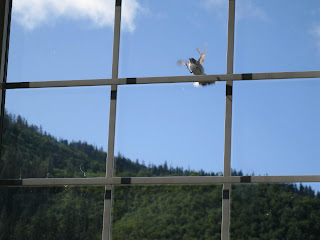GLASS
The candles flicker and incense curls up around the icon of Christ Pantocrator. The teacher. The Word. Air currents I am too dense to feel carry the lavender scent past the icon out the open window to the tiny gray bushtit who for two days now has flitted against the reflection of the sea-glass tree, trying to get in. I watch her as though she is my soul attempting to penetrate the membrane between worlds. "Fly the other way," I tell her, frightened she will break herself with the effort to realize her illusion, "turn towards the tree itself, towards the open sky."
"Suffer us not to mock ourselves with falsehood," prays the poet, and I with him every day or so. But how does one distinguish falsehood from a paradox? Look back upon your life: do you know? Do you see how desire twines with vision? And what is it anyway that we call a breakthrough? "It's a reflection," I tell the bushtit; "you can't break through; it's glass; it's a mirror; you will kill yourself. Turn the other way."
There's something here I can't find words for. Is the breakthrough in the turning?
But even as I wonder that, along comes another poet, Anne Carson, who tells me, "The outer walls of God are glass."
And I am left with metaphor and paradox again.



Comments
Being originally from Bellingham, WA, we miss both Oregon and Washington.
Stratoz -- The Anne Carson quote comes from her book: GLASS, IRONY AND GOD. Well worth your time.
I'm not expecting an answer;I'm just mulling it over.
"I love the pict of the bushtit at your window. What a thing. Platonic meditation on mimesis versus Form Itself, which is reality as reflection, but still with substance, tree and sky that will not break like glass. The skin of God is glass, eh? Breakable God. Transparent God. Stained glass God. Like us, broken, transparent, no place to hide, stained and exquisite all the same."
As to what Anne Carson might have meant. . .